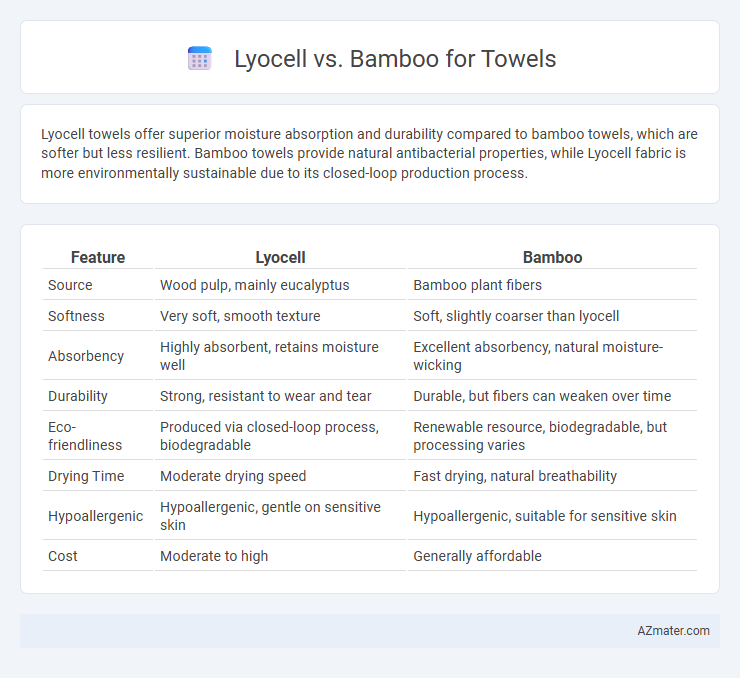Lyocell towels offer superior moisture absorption and durability compared to bamboo towels, which are softer but less resilient. Bamboo towels provide natural antibacterial properties, while Lyocell fabric is more environmentally sustainable due to its closed-loop production process.
Table of Comparison
| Feature | Lyocell | Bamboo |
|---|---|---|
| Source | Wood pulp, mainly eucalyptus | Bamboo plant fibers |
| Softness | Very soft, smooth texture | Soft, slightly coarser than lyocell |
| Absorbency | Highly absorbent, retains moisture well | Excellent absorbency, natural moisture-wicking |
| Durability | Strong, resistant to wear and tear | Durable, but fibers can weaken over time |
| Eco-friendliness | Produced via closed-loop process, biodegradable | Renewable resource, biodegradable, but processing varies |
| Drying Time | Moderate drying speed | Fast drying, natural breathability |
| Hypoallergenic | Hypoallergenic, gentle on sensitive skin | Hypoallergenic, suitable for sensitive skin |
| Cost | Moderate to high | Generally affordable |
Introduction to Lyocell and Bamboo Towels
Lyocell towels are made from sustainably sourced wood pulp, offering exceptional softness, high absorbency, and durability that outperforms traditional cotton towels. Bamboo towels are crafted from bamboo fibers, known for their natural antimicrobial properties, moisture-wicking abilities, and eco-friendly production process. Both Lyocell and bamboo towels provide breathable, hypoallergenic alternatives, making them ideal for sensitive skin and sustainable home textiles.
Material Origins: Lyocell vs Bamboo
Lyocell fibers are produced from sustainably sourced wood pulp, primarily eucalyptus, using a closed-loop process that minimizes environmental impact. Bamboo fabric originates from the pulp of bamboo grass, processed either mechanically or chemically, with mechanical methods being more eco-friendly. Both materials emphasize renewable sources, but Lyocell's production process offers higher sustainability through efficient chemical recovery and reduced water usage compared to most bamboo fabric manufacturing methods.
Production Process and Sustainability
Lyocell towels are produced using a closed-loop process that recycles almost 99% of solvents, significantly reducing environmental impact compared to traditional methods. Bamboo towels derive from bamboo pulp, often processed mechanically or chemically, with mechanical processing offering a more eco-friendly option by minimizing chemical use. Both fibers are biodegradable and renewable, but Lyocell's eco-conscious production method positions it as a more sustainable choice in terms of energy efficiency and chemical management.
Softness and Comfort Comparison
Lyocell towels provide exceptional softness due to their smooth fiber structure, offering a silky touch that enhances comfort against the skin. Bamboo towels are naturally soft and breathable, with moisture-wicking properties that improve comfort during use. While both materials excel in softness, Lyocell typically delivers a more luxurious, silky feel, whereas bamboo offers a slightly more textured but highly breathable experience.
Absorbency and Drying Performance
Lyocell towels exhibit superior absorbency due to their cellulose fiber structure, which efficiently draws moisture away from the skin compared to bamboo towels. Bamboo towels are known for their natural antibacterial properties and moderate absorbency, but they tend to retain more water, leading to longer drying times. In terms of drying performance, lyocell dries faster, reducing the risk of mildew and enhancing overall towel hygiene.
Durability and Longevity
Lyocell towels offer exceptional durability due to their strong, eco-friendly fibers derived from wood pulp, which resist pilling and maintain softness after multiple washes. Bamboo towels also provide impressive longevity with natural antibacterial properties and high tensile strength, but they tend to be slightly less durable than Lyocell under heavy use. Choosing Lyocell ensures longer-lasting towels with sustained absorbency, while bamboo excels in comfort and natural antimicrobial benefits.
Hypoallergenic and Skin-Friendly Properties
Lyocell and bamboo fibers are both known for their hypoallergenic qualities, making towels crafted from these materials ideal for sensitive skin. Lyocell's smooth fibers reduce irritation and repel dust mites, while bamboo towels inherently resist bacteria and moisture, enhancing skin comfort. Towels made from these eco-friendly fabrics provide excellent breathability and softness, promoting a gentle, skin-friendly experience.
Environmental Impact: Which is Greener?
Lyocell and bamboo towels both offer eco-friendly alternatives to conventional cotton, but Lyocell typically ranks greener due to its closed-loop production process that recycles water and solvents, minimizing waste and emissions. Bamboo cultivation requires fewer pesticides and grows rapidly, yet the mechanical and chemical processing of bamboo fibers often involves harmful chemicals, increasing its environmental footprint. Overall, Lyocell's sustainable manufacturing and biodegradability provide a lower impact option for environmentally conscious towel consumers.
Price and Value for Money
Lyocell towels generally offer a higher price point compared to bamboo towels, reflecting their eco-friendly production and durability. Bamboo towels provide excellent value for money due to their natural antibacterial properties and softness at a more affordable cost. Choosing between lyocell and bamboo depends on balancing budget constraints with preferences for longevity and sustainability.
Final Verdict: Choosing Between Lyocell and Bamboo Towels
Lyocell towels offer superior softness, moisture absorption, and durability due to their sustainable production process involving eucalyptus wood pulp. Bamboo towels are naturally antimicrobial and eco-friendly, with excellent breathability but may wear out faster and require gentler care. Choosing between Lyocell and Bamboo towels depends on prioritizing long-lasting softness and strength versus natural antibacterial properties and a slightly lower environmental impact.

Infographic: Lyocell vs Bamboo for Towel
 azmater.com
azmater.com